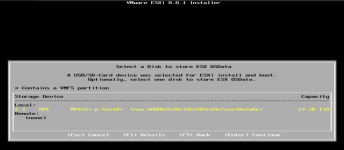I recently installed esxi 8 on usb and saw what I have attached as an image.
I have always installed to USB and then placed the swap file with the VM.
What is considered best practise or the way to do it today? What is OSData, does it update that often that I should be worried about the USB disk?
I have always installed to USB and then placed the swap file with the VM.
What is considered best practise or the way to do it today? What is OSData, does it update that often that I should be worried about the USB disk?

